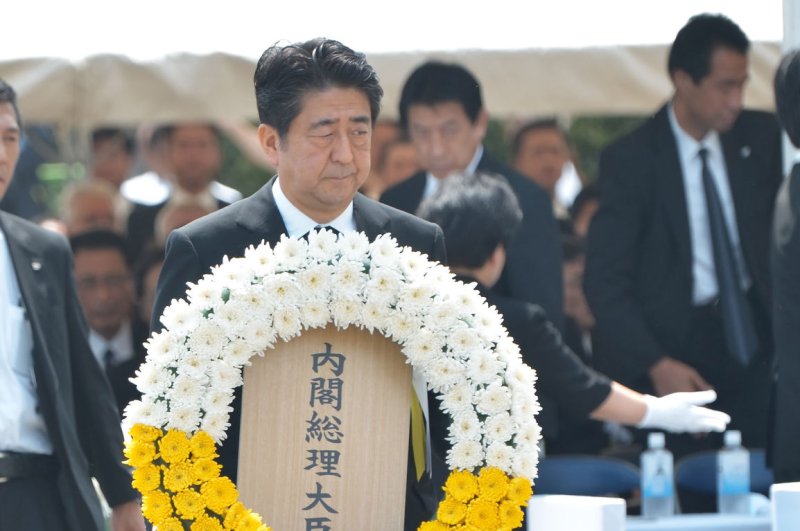Japan's Prime Minister Shinzo Abe holds a wreath during a ceremony at the Peace Park marking the 70th anniversary of the atomic bombing in Nagasaki, Japan, on Aug. 9, 2015. Photo by Keizo Mori |
License Photo
TOKYO, Aug. 14 (UPI) -- Japanese Prime Minister Shinzo Abe offered remorse for Japanese actions in World War II Friday, but deliberately did not offer an apology.
Reading a carefully-worded text on national television to commemorate the 70th anniversary of Japan's surrender, Abe said in part, "I bow my head deeply before the souls of all those who perished both at home and abroad. I express my feelings of profound grief and my eternal, sincere condolences. We must not let our children, grandchildren, and even further generations to come, who have nothing to do with that war, be predestined to apologize. Still, even so, we Japanese, across generations, must squarely face the history of the past. We have the responsibility to inherit the past, in all humbleness, and pass it on to the future."
How Abe would phrase Japan's post-war attitude was of interest across eastern Asia, and especially in China and South Korea, where officials have been critical of his administration's efforts to revise how Japan's wartime history is explained.
A commentary by China's state-run Xinhua News Agency said of Abe's address, "The apology was a diluted one at best, thus marking only a crippled start to build trust among its neighbors. Instead of offering an unambiguous apology, Abe's statement is rife with rhetorical twists. By adding that it is unnecessary for Japan's future generations to keep apologizing, Abe seemed to say that his once-for-all apology can close the page of history."
The speech was a balancing act for Abe, as well as a statement of Japan's foreign policy. While dealing with nationalism in Japan and the building of a more flexible military force, he is attempting to mend fences with China and South Korea, each now a major economic force in Asia and a casualty of Japanese imperialism during and prior to World War II, while seeking not to alienate the United States, Japan's closest ally.
His comments included a passing reference to Chinese and Korean "comfort women" forced into sexual slavery by the Japanese military during the war.
"We will engrave in our hearts the past, when the dignity and honor of many women were severely injured during wars in the 20th century. Upon this reflection, Japan wishes to be a country always at the side of such women's injured hearts," he said, stopping short of admitting Japan's role.















